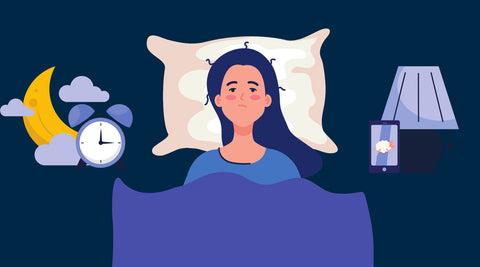Why is sleep so important?
Across the world many people suffer from sleep disorder. There are many types of sleep disorders; common ones such as snoring, sleep apnea, restless legs syndrome and the one we will be talking about more, circadian sleep disorder which is a delayed sleep-wake phase disorder (DSWPD).
Delayed sleep-wake phase disorder is a condition where a person’s sleep is delayed by two or more hours beyond the socially acceptable or conventional bedtime. This delay in falling asleep causes difficulty in waking up at a socially acceptable time / desired time.
Those that suffer have difficulty falling asleep and staying awake. It is common that symptoms can last for at least 3 months, along with difficulty falling asleep, difficulty waking up, daytime sleepiness, poor energy, and are often comorbid with depression.

It is very common for those to be known as “night owls”, as they function best during the evenings and early morning hours.
Those who identify as “night owls” generally manage on shorter amounts of sleep during the week and on the weekends they generally sleep in until late morning to mid afternoon. DSWPD is common in adolescents and young adults, with a prevalence of 7% to 16%.

How does blue light help
One of the main ways of trying to treat delayed sleep wake phase disorder is to correct the disturbed circadian rhythms, thus improving sleep quality, the duration of sleep and the overall daytime function.
Blue light is known as an inhibitor of naturally produced melatonin; melatonin is a hormone which is secreted by the pineal gland, and controls sleep wake cycle.
Blue light exposure during certain times of the day can help to regulate the circadian rhythm, with a higher exposure during the day and minimal to no exposure in the evening.
Clinical Experiment on using Blue Light Therapy
A study done in China at the First Hospital of Hebei Medical University, Shijiazhuang did just this, they investigated the clinical effect of blue light therapy on patients with delayed sleep-wake phase disorder.
By exposing the participants to a light intensity in the morning, and then continuing to limit their exposure to bright light caused a shift in their sleep wake phase, bringing the time they fell asleep earlier. Not only were the participants falling asleep earlier, they also showed that their sleep quality and daytime functioning improved the following day, and had fewer nocturnal awakenings and shorter awakening times.
Further studies found that light in the wavelength range of 420nm to 500nm has a significant effect on the circadian rhythm of the human body, and that short wavelength light near 460nm (blue light) has the strongest inhibitory effect on endogenous melatonin secretion at the same light intensity, and also has the most significant effect on the phase change of biological clock, wakefulness and pupil light reflection.
Outcome of Blue Light Therapy
These findings are consistent with this study that morning blue light therapy can support a sleep advancement program by phasing in circadian rhythms as well as sleep duration.
In addition, patients wearing blue light glasses hardly noticed side effects such as eye fatigue, nausea, agitation, mania and migraine. In general, patients have a positive attitude towards blue light glasses and are willing to continue using them. This experiment has shown that increased exposure, especially close to bedtime, to blue light can alter one's sleep wake cycle.

This is why blue light blocking glasses or filters, such as the Ocushield products, are used to limit the effects of blue light emitted from devices such as laptops and mobile phones.
These are now even more important as the majority of the population are now working longer hours into the evenings, with increased exposure to blue light circadian rhythms are continually pushed later and later, thus causing more people to be suffering from delayed sleep-wake phase disorder. Lack of sleep or sleep deprivation has been used for many years as a form of torture in a variety of prisons and unfortunately in the first world we are now torturing ourselves now with lack of sleep.
How we reviewed this article:
Ocushield has strict sourcing guidelines and relies on peer-reviewed studies, academic research institutions, and medical associations.
Our experts continually monitor the health and wellness space, and we update our articles when new information becomes available.

Leave a comment